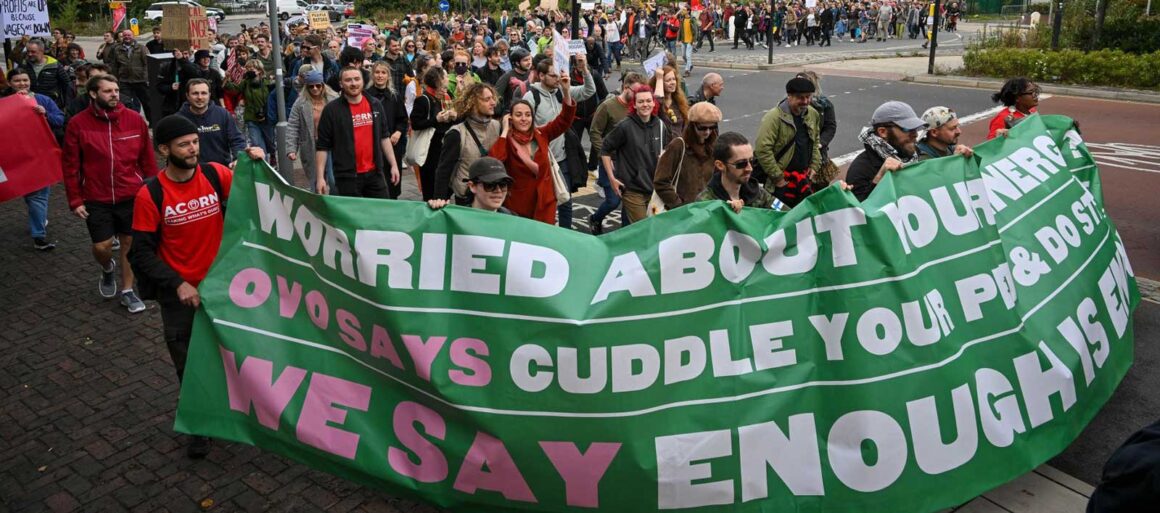

THE CURRENT strike wave represents the biggest and most widely spread opposition to capital since the 1980s, with up to 3 million strike days between June 2022 and the beginning of this month. The trains, postal service, hospitals, schools, universities, colleges and civil service have all seen industrial action.
Local strikes, like Abellio buses in London, have added to the general sense of a class fighting back. The 1 February joint strike, led by young teachers on the ground, marked the first co-ordinated action with half a million on strike, the biggest walkout in 12 years.
The stakes are high. If we lose, if union leaders were to settle for the kind of deal on offer, 4.5% this year, 4.5% for 2023–24 as is being touted on the rail, then the working class would suffer a huge defeat, a 12–15% drop in real income. With such a backdrop it is hard to see the unions mobilising to stop the new anti-strike Bill.
If we win, on the other hand, inflation matching pay rises or better, then the question would be, can we make these gains permanent? That makes the current situation a potential turning point for the class struggle in Britain. And not only here, as workers across Europe and North America are watching Britain as a country where the worldwide bosses’ offensive could be broken.
The predominant union strategy rests on one or two day strikes, sometimes in quick succession, followed by long periods during which secret negotiations take place. It’s not working. The only thing that is moving is the union leaders’ resolve to insist on the full claim—and that applies equally to Mick Lynch (RMT) as it does to Pat Cullen (RCN). If isolated, non-escalating, warning strikes were going to win, they would have done so by now.
The danger is that the rank & file get worn down by the ‘We’ll do this for as long as it takes’ strategy sooner than the government or the private sector employers and either an ‘Accept anything that’s on offer at this stage’ attitude sets in or a drift back to work sets in.
Now, however, there is still strong enthusiasm for the strikes, both among the rank & file and in the support groups. Nationally though, Enough is Enough and People’s Assembly have failed, because the union bureaucrats (or their political bag-carriers in the case of PA) fear the development of a class struggle in the real and not just rhetorical sense of the word. They want their hands free to settle at the first opportunity, and widespread, organised militancy in the workers movement could force them to keep fighting.
Rank and file
The key to the current strike wave lies in organising the rank & file, both within unions but just as importantly across them. By rank & file we mean those workplace-based activists who have been campaigning and organising in the strikes and ballots or in support of them. This was obvious with the NEU schools contingents on 1 February. Other unions should copy them and follow the old slogan ‘Educate, Agitate, Organise’.
Activists need to be put in touch with each other locally, via existing solidarity networks or by setting one up, and nationally, so they can challenge and hold to account their leaders.
But it is not just a question of sharing experiences, providing morale, even financial and industrial support (not crossing picket lines, etc.), but also of organising action. For example, instances of victimisation of local militants have run into their hundreds; we need immediate, strike action—wildcat or unofficial if need be—to stop the bosses taking leading militants hostage.
It should not be underestimated how the strike wave—in getting out the votes, organising picket lines and demos, going on strike and attending pickets—has brought in new union activists and developed existing ones. Union consciousness is now at a high and it needs to have permanent results. Kevin Courtney reports the NEU recruited 40,000 new members in the fortnight since the strikes were announced.
General strike
The NEU has called its next national strike on 15 March; Mark Serwotka has supported the appeal and called on other unions to join in. To keep the momentum rising, it has to be bigger than 1 February, a million or more.
The rank and file of the unions, solidarity groups and socialists must build for this date by demanding their leaders to rise to the call and by organising for unofficial action if they do not. That means building councils of action with delegates from local workplaces, union branches and other working class organisations to mobilise and plan for the day.
The objective situation, including the new anti-strike Bill, certainly poses the question of a general strike. Some on the left have called for a one-day general strike and insofar as this reflects a will for unity, this is understandable. Indeed, we should do all in our power to make 15 March one. Then it would be a matter of what happens the day after. Strike rallies should make the call for all out, indefinite, mass strikes impossible for the leaders to ignore.
It is clear that victory over the bosses and their government will not be won by a single day protest strike, no matter how big. What we need more than anything is to force the unions to call sharply escalating action up to an all-out general strike.